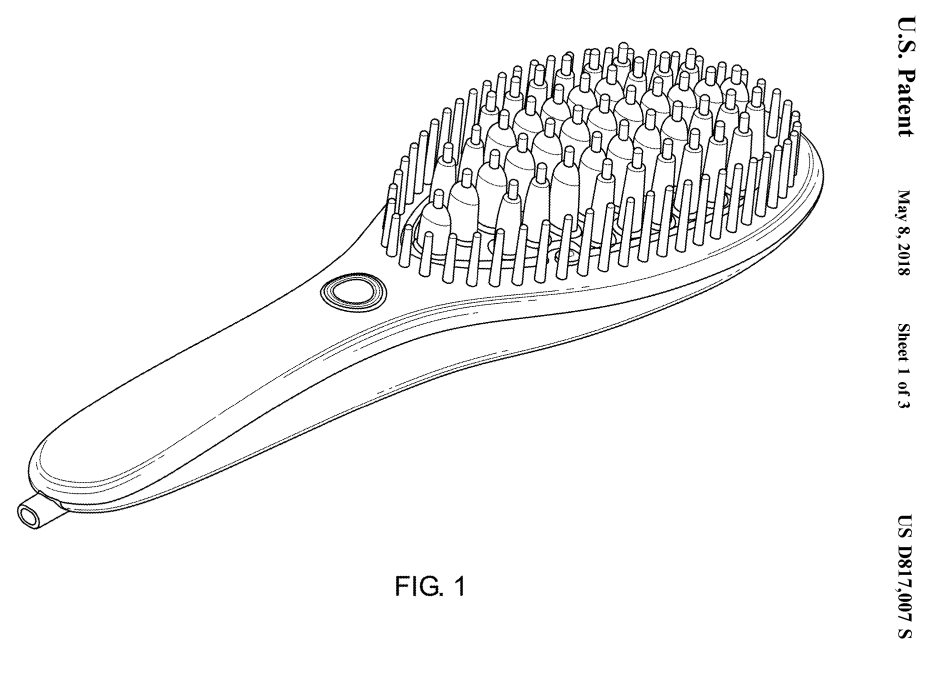Federal Circuit Declines to Disturb PTAB’s Upholding of Dafni’s Hair Brush Patent
In a recent nonprecedential decision, the Federal Circuit dismissed Ontel’s appeal seeking to overturn the PTAB’s IPR decision upholding the patentability of Dafni’s hair straightening brush patents. Ontel Products Corp. v. Guy A. Shaked Invs. Ltd., No. 2022-1938 (Fed. Cir. Dec. 19, 2023). The court held that Ontel lacked standing to appeal because “the dispute between Ontel and Dafni over this patent is moot.” Under the mootness doctrine, “a case becomes moot ‘when the issues presented are no longer live or the parties lack a legally cognizable interest in the outcome.’” ABS Global, Inc. v. Cytonome/ST, LLC, 984 F.3d 1017, 1020 (Fed. Cir. 2021). At the same time, the panel refused to vacate the PTAB decision upholding the ‘562 patent claims, holding that the case “became moot through actions that are closer to joint settlement than to unilateral action” by Dafni.
In my earlier post, I noted my hope that the Federal Circuit would reach the substantive issues that focused on the role of secondary considerations in obviousness determinations and whether Dafni had established the required nexus between the evidence of industry praise and acceptance and the claimed invention. The mootness conclusion precludes that analysis.

Dafni had originally sued Ontel for infringing several different patents. Ontel successfully petitioned for Inter Partes Review (IPR) of one, US9877562, and the district court agreed to stay litigation pending outcome of the IPR. Rather than waiting for that outcome, Dafni, with cooperation from Ontel, entered a stipulated dismiss of the ‘562 infringement allegations. The basic idea was that by removing that patent out of the queue, the case asserting US9578943 could move forward. Dafni eventually won the IPR with a PTAB final written decision holding that the claims had not been proven invalid. Ontel appealed, but the Federal Circuit has now dismissed the appeal as moot.
In explaining why Ontel lacked a concrete stake in the appeal, the court emphasized that “Dafni’s prior ’562 patent-infringement claim against Ontel is no longer pending” and that Dafni’s “disclaimer of any right to challenge the district court’s order dismissing the claim of infringing that patent (including by seeking to reinstate the ’562 patent-infringement claim), precludes any new assertion of that patent against Ontel.” Further, Ontel provided no “evidence of planned or likely future conduct that could risk potential-infringement liability” and identified no “relevant contractual rights” affected by the PTAB decision.
The court rejected Ontel’s assertion that it had an interest in preventing Dafni from relying on the PTAB decision regarding the ’562 patent in separate litigation involving Dafni’s ’943 patent. As the court explained, issue preclusion does not apply to unappealable PTAB decisions, and “the potential for collateral consequences” of the PTAB’s conclusions is insufficient to supply standing. Quoting Best Medical International, Inc. v. Elekta Inc., 46 F.4th 1346, 1353 (Fed. Cir. 2022)
Having found the dispute over the ’562 patent moot, the court next considered the proper disposition—whether to simply dismiss the appeal or also vacate the PTAB decision under United States v. Munsingwear, Inc., 340 U.S. 36 (1950). As the Supreme Court has made clear, “[v]acatur is in order when mootness occurs through happenstance—circumstances [either] not attributable to the parties [or attributable to] the ‘unilateral action of the party who prevailed in the lower court.” Arizonans for Official English v. Arizona, 520 U.S. 43 (1997). However, “mootness by reason of settlement does not justify vacatur.” U.S. Bancorp Mortg. Co. v. Bonner Mall P’ship, 513 U.S. 18 (1994).
Here, the court found Dafni did not unilaterally cause mootness but rather the case “became moot through actions that are closer to joint settlement than to unilateral action.” The court highlighted a joint stipulation dismissing the ’562 patent claims, Ontel’s opposition to reinstating those claims, and Dafni’s ultimate disclaimer of any right to challenge that dismissal order. Exercising its “equitable discretion,” the Federal Circuit declined to also vacate the PTAB decision upholding the ’562 patent claims.
-
Previous:
-
Next:






